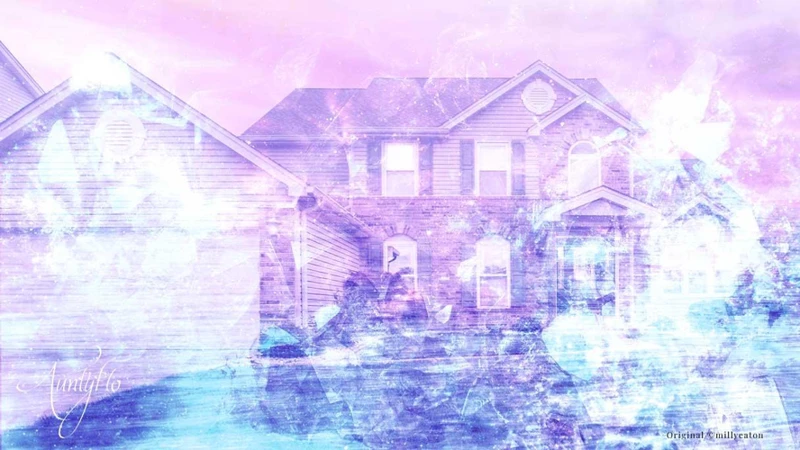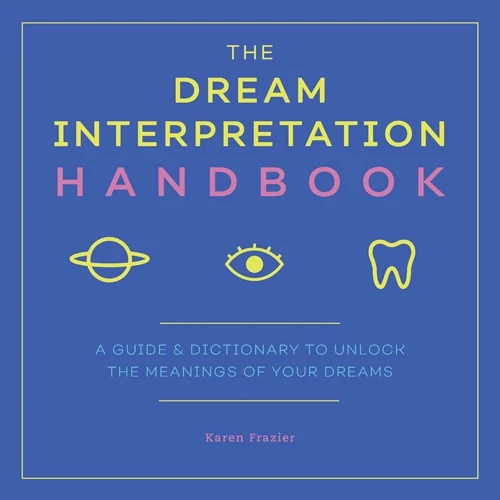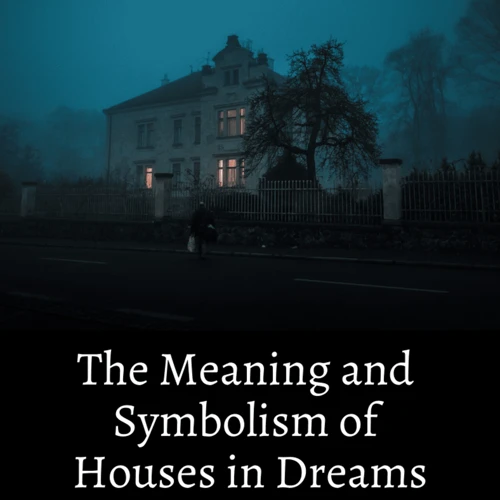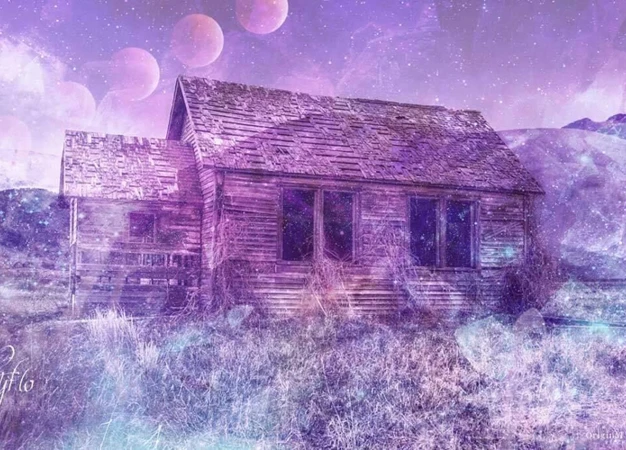What if the houses that appear in our dreams held deeper meaning than we realized? In the realm of dream interpretation, deciphering the symbolism behind dream houses can unlock a wealth of insights into our subconscious minds. These dream houses serve as metaphors for our emotions, desires, and personal experiences. By delving into the symbolic meanings behind various aspects of dream houses, such as their architecture, rooms, and interior design, we can gain a greater understanding of ourselves and our lives. Join us on this journey as we explore the fascinating world of dream houses and uncover the hidden messages they hold.
The Importance of Dream Symbols

The importance of dream symbols lies in their ability to provide a glimpse into our subconscious minds and offer valuable insights into our innermost thoughts, feelings, and experiences. Dreams serve as a vehicle through which our subconscious communicates with us, using symbols to convey complex emotions and messages. When we pay attention to these symbols, we can unravel the hidden meanings and gain a deeper understanding of ourselves. Dream symbols can range from animals (learn more about symbolism of dream animals here) to water (explore the symbolic meaning of water in dreams here) to numbers (discover the significance of numbers in dream symbolism here). Each symbol holds its own unique significance and can provide powerful insights into our subconscious desires, fears, and memories. By analyzing and interpreting these symbols, we can unlock a wealth of self-knowledge and personal growth. Whether we dream of houses, animals, or everyday objects, understanding the importance of dream symbols allows us to tap into the rich tapestry of our inner selves.
1. Understanding the Subconscious Mind
Understanding the subconscious mind is vital when it comes to interpreting dream symbols, including those related to dream houses. The subconscious mind is the hidden part of our psyche that operates below our conscious awareness. It is responsible for storing memories, emotions, and desires that may not always be readily accessible to us. Dreams serve as a bridge between the conscious and subconscious mind, allowing us to gain insight into our deepest thoughts and feelings. Carl Jung, a renowned psychologist, believed that dreams were a window into the unconscious and offered valuable clues about our inner world. By understanding the subconscious mind, we can recognize that dream symbols, such as houses, are not to be taken literally but rather symbolically. They represent aspects of ourselves and our lives that may be concealed or repressed in our waking lives. Delving into the subconscious mind through dream analysis can provide profound self-awareness and lead to personal growth and transformation.
2. Interpreting Symbolic Dream Elements
Interpreting symbolic dream elements is a crucial aspect of understanding the deeper meaning behind our dreams. When we dream, our subconscious mind presents us with a vivid assortment of symbols and imagery that may seem confusing or disjointed at first. However, by analyzing these elements, we can uncover hidden messages and emotions that our subconscious is trying to convey. Here are a few key approaches to interpreting symbolic dream elements:
1. Personal Associations: One effective method is to consider the personal associations we have with specific symbols. For example, if a dream features a cat, we may explore our personal feelings towards cats, whether they evoke feelings of comfort, fear, or curiosity. These associations can provide insights into the emotions and experiences tied to the symbol.
2. Cultural and Archetypal Meanings: Symbols also carry cultural and archetypal meanings that can shed light on their significance. For instance, a snake often symbolizes transformation or healing across various cultures. Understanding these shared meanings can offer a broader understanding of the symbolic element in our dream.
3. Dream Context: Examining the overall context of the dream can aid in interpreting symbolic elements. It is essential to consider other characters, settings, and events within the dream, as they may influence the symbolism. Additionally, paying attention to emotions experienced during the dream can provide valuable clues about the message being conveyed.
4. Dreamer’s Intuition: Trusting our intuition is essential when interpreting dream symbols. Sometimes, a symbol may hold a personal meaning that is unique to the dreamer. It is crucial to listen to our instincts and inner guidance when deciphering the symbolism in our dreams.
By employing these approaches and considering the unique combination of elements present in our dreams, we can begin to unravel the symbolic messages hidden within. Remember, dream interpretation is subjective, and each individual may have their own unique interpretations based on their personal experiences and feelings.
Exploring Dream Houses

Dream houses serve as fascinating landscapes in which our subconscious mind weaves its narratives. Exploring dream houses allows us to delve into the depths of our own psyche and uncover hidden aspects of ourselves. When it comes to dream houses, there are various dimensions to explore. Firstly, we can consider the different types of dream houses that appear in our dreams. These can range from humble cottages to opulent mansions and everything in between. Each type of house carries its own symbolic meaning and reflects different aspects of our desires, ambitions, and self-perception. Additionally, the locations and environments of dream houses play a significant role in the overall symbolism. Whether the dream house is situated in a bustling city or a serene countryside, the location adds another layer of meaning to the dream. The surrounding environment may represent the opportunities and challenges we face in our waking lives. By exploring dream houses, we can navigate through the landscapes of our own minds and gain a deeper understanding of the subconscious forces at play.
1. Types of Dream Houses
When it comes to dream houses, there is a wide range of types that can appear in our dreams. These dream houses can vary in size, style, and location, each carrying its own symbolic meaning. One common type of dream house is the Victorian-style house, known for its intricate architecture and grandeur. These houses often symbolize a desire for elegance, tradition, and a connection to the past. Another type is the modern and minimalist dream house, characterized by clean lines, open spaces, and simplicity. These houses often represent a longing for simplicity, organization, and a sense of contemporary style. On the other hand, cottage-style dream houses evoke a sense of coziness, simplicity, and a desire for a more rustic and serene lifestyle. Additionally, dream houses can also reflect specific environments, such as beach houses, mountain cabins, or city apartments, each with its own connotations. For example, a beach house may symbolize relaxation, freedom, and a desire for escape, while a mountain cabin may represent solitude, introspection, and a connection to nature. The types of dream houses we encounter in our dreams reflect our subconscious desires, aspirations, and the environment we find ourselves in internally or externally. By understanding the symbolism behind different types of dream houses, we can gain valuable insights into our innermost wishes and longings.
2. Locations and Environments
When exploring dream houses, the locations and environments in which they are situated hold significant symbolic meaning. The specific location of a dream house can reflect various aspects of our lives and inner states. For example, a dream house located in a bustling city environment may represent a desire for excitement, ambition, and success. On the other hand, a dream house nestled in a serene countryside setting may symbolize a longing for peace, tranquility, and a simpler way of life. The location can also be associated with personal experiences or memories. A dream house near a childhood home location may carry nostalgic feelings and a sense of roots. Alternatively, a dream house near a place of significance, such as a workplace or school, could symbolize the importance of career or learning in our lives. By paying attention to the locations and environments of dream houses, we can gain deeper insights into our desires, aspirations, and past experiences.
Decoding Dream House Features

Decoding the features of dream houses can provide valuable insights into the symbolic meanings and messages behind our dreams. The architecture and structure of a dream house can represent the foundation of our lives and our sense of stability and security. For example, a crumbling or unstable house may indicate feelings of insecurity or instability in our waking lives. The rooms and spaces within a dream house can hold significant meaning. Bedrooms may symbolize intimacy and personal desires, while kitchens can represent nourishment and sustenance. The interior design and décor of a dream house can also offer important clues. Colors, furniture, and decorations can reflect our emotions, personal tastes, and self-expression. A cluttered or disorganized house may suggest inner turmoil or chaos, while a neat and organized house may indicate a sense of control and harmony. By decoding these various features of dream houses, we can gain a deeper understanding of ourselves, our emotions, and our subconscious desires.
1. Architecture and Structure
Analyzing the architecture and structure of dream houses can provide valuable insights into the symbolic meaning behind them. The design of the house, whether it’s grand and ornate or simple and modest, can represent the level of importance we place on our personal identity and self-worth. A large, impressive house may signify a desire for recognition and achievement, while a small, cozy house may reflect a need for simplicity and contentment. The materials used in the construction of the dream house can also hold significance. A house made of sturdy brick or stone may symbolize a sense of stability and security, while a house made of fragile materials like glass or wood might represent vulnerability or a need for protection. Additionally, the overall structure of the dream house, such as the number of floors or rooms, can offer insights into the different aspects of our lives that we may be exploring or neglecting (see also the significance of numbers in dream symbolism). By examining the architectural elements of dream houses, we can gain a deeper understanding of our desires, aspirations, and the foundations upon which our lives are built.
2. Rooms and Spaces
When it comes to decoding dream houses, the rooms and spaces within them play a significant role in understanding their symbolic meaning. Each room in a dream house represents different aspects of our lives and emotions. For example, a bedroom often represents intimacy, personal relationships, and rest, while a kitchen symbolizes nourishment, creativity, and sustenance. The living room may signify social interactions, communication, and connections with others, while the bathroom relates to cleansing, release, and letting go. The size, layout, and condition of these rooms also hold significance. A spacious and well-maintained room might indicate balance, harmony, and a sense of fulfillment, while a cluttered or neglected room could suggest unresolved issues or emotional baggage. Additionally, the presence or absence of certain rooms can convey specific messages. A dream house without a kitchen may signify a lack of nourishment or creativity in our lives, whereas a house with multiple levels or hidden rooms may represent unexplored aspects of ourselves or undiscovered potential. By analyzing the rooms and spaces within dream houses, we can gain valuable insights into different areas of our lives and the emotional states associated with them.
3. Interior Design and Décor
When it comes to unlocking the symbolic meaning of dream houses, the interior design and décor play a crucial role in providing insights into our subconscious minds. Every aspect of the interior design, from the color scheme to the furniture, holds significance and can represent different aspects of our emotions and experiences. Here are some key elements of interior design and décor in dream houses and their symbolic interpretations:
1. Color scheme: The colors chosen for the walls, furniture, and accessories in our dream houses can reflect our emotions and moods. For example, vibrant and bold colors like red may symbolize passion or intense emotions, while calming colors like blue or green could represent tranquility or healing.
2. Furniture placement: The arrangement of furniture in our dream houses can signify our attitudes and relationships. A cluttered and disorganized space may suggest feelings of chaos or stress, while a well-organized and harmonious arrangement can indicate a sense of balance and control in our lives.
3. Decorative elements: Objects and decorations in dream house interiors carry their own symbolic meanings. For instance, paintings or photographs may represent memories or aspirations, while mirrors can symbolize self-reflection or introspection.
4. Lighting: The lighting in dream house interiors can represent our perception and understanding of situations or emotions. Bright and well-lit spaces may suggest clarity and optimism, while dim or flickering lights could signify confusion or uncertainty.
5. Personal touches: Pay attention to any personal items or unique features in the dream house’s interior. These can reflect aspects of our identity, desires, or personal history.
By analyzing the interior design and décor in our dream houses, we can gain further insights into our subconscious thoughts, emotions, and experiences. Each element carries its own symbolic significance, and connecting these symbols to our waking lives can provide valuable guidance and understanding.
Symbolic Meanings of Dream Houses

Symbolic meanings lie at the heart of dream houses, as they represent various aspects of our lives and inner selves. Understanding these symbolic meanings allows us to gain a deeper insight into our subconscious desires, emotions, and experiences. Here are some key symbolic meanings of dream houses:
1. Security and Shelter: Dream houses often symbolize our need for security and protection. The state of the house, such as its solidity or disrepair, can reflect our sense of stability in waking life. A well-maintained and secure dream house may signify a strong foundation and a sense of safety in our lives.
2. Personal Identity and Self-Expression: Dream houses can also represent our personal identity and self-expression. The design, architecture, and decorations of the house reflect our individuality, aspirations, and creativity. Elements such as color schemes, furniture, and artwork can provide clues about our personality and how we present ourselves to the world.
3. Relationships and Family: Dream houses often symbolize our relationships and family dynamics. Different rooms within the house may represent different relationships or aspects of our family life. For example, the kitchen might symbolize nourishment or nurturing, while the bedroom may symbolize intimacy or emotional connections.
4. Emotional States and Psychological Well-Being: The state of the dream house can reflect our emotional well-being. A tidy and well-organized house may represent a sense of inner harmony and emotional balance. Conversely, a chaotic or dilapidated house may indicate feelings of stress, turmoil, or emotional unrest.
The symbolic meanings of dream houses can vary depending on the specific details, context, and personal associations. It is essential to pay attention to these symbols and reflect on their relevance to our own lives and experiences. By unraveling the symbolic meanings of dream houses, we can gain valuable insights into ourselves and navigate our waking lives with greater self-awareness.
1. Security and Shelter
When a dream features a house, the aspect of security and shelter plays a significant role. Dream houses symbolize our need for stability, protection, and a sense of belonging. The state of the house in the dream reflects our current feelings of safety and security in our waking lives. A well-maintained and secure house represents a stable and protected emotional state. Conversely, a rundown or dilapidated house may suggest feelings of insecurity or instability in our personal lives. Additionally, the architectural features of the house, such as strong foundations or fortified doors and windows, can further emphasize the importance of security and protection. Dreaming of a secure and cozy house might indicate that we are feeling safe and grounded in our waking life, while a dream featuring an unsafe or unsecure house may be a sign of our need to establish or reinforce a sense of security and stability within ourselves and our environment. Exploring the symbolism of security and shelter within dream houses can provide valuable insight into our emotional well-being and the level of comfort and protection we seek.
2. Personal Identity and Self-Expression
Personal identity and self-expression play a significant role in the symbolic meanings of dream houses. The house in our dreams often represents not only our physical dwelling but also our inner selves and our sense of identity. The design, style, and condition of the house can reflect how we perceive ourselves and how we express our individuality to the world. For example, a dream house that is meticulously organized and beautifully decorated may indicate a strong sense of self and a desire for perfection (Oxford Languages defines “perfection” as “the condition, state, or quality of being free or as free as possible from all flaws or defects”). The house may symbolize our need for control and order in our lives, reflecting a desire to present ourselves in a polished and put-together manner. On the other hand, a dream house that is in a state of disrepair or disarray may suggest inner turmoil or a lack of self-care (Oxford Languages defines “self-care” as “the practice of taking an active role in protecting one’s own wellbeing and happiness, in particular during periods of stress”). It may signify a need to address neglected aspects of our personal identity, such as unfulfilled passions or unresolved emotions. The various rooms within the dream house can also offer insights into different aspects of our identity. For example, a dream bedroom may symbolize our private thoughts and intimate desires, while a dream kitchen may represent our nurturing and creative abilities. By examining the personal identity and self-expression elements of dream houses, we can gain a deeper understanding of ourselves and our desires for self-fulfillment and authenticity.
3. Relationships and Family
In the realm of dream houses, the symbolic meaning of relationships and family plays a significant role. When dream houses portray scenarios involving relationships and family dynamics, they often reflect our deep-seated emotions, desires, and connections with our loved ones. The various features and elements within the dream house can shed light on the state of our relationships and the dynamics at play. For example, a dream house with spacious, inviting common areas and warm, cozy bedrooms may indicate a harmonious and loving family life. On the other hand, a dream house with broken or deteriorating rooms and a tense atmosphere may signify underlying tensions or conflicts within a family unit. Dreams involving relationships and family in the context of dream houses can also symbolize our longing for a sense of belonging and connection. It may reflect our subconscious desires for a nurturing and supportive family environment or our yearning for closer relationships with loved ones. Exploring the symbolic meaning of relationships and family within dream houses can provide valuable insights into the state of our emotional bonds and help us navigate our personal connections in waking life.
4. Emotional States and Psychological Well-Being
When exploring the symbolic meanings of dream houses, one important aspect to consider is their representation of our emotional states and psychological well-being. Dream houses often reflect our innermost emotions and can serve as a mirror for our current mental and emotional state. For example, a dream house that is in pristine condition, with well-maintained rooms and a sense of order, may represent a sense of peace, stability, and contentment in our waking life. On the other hand, a dilapidated or damaged dream house may signify feelings of turmoil or unrest. The condition of the house, the ambiance, and the atmosphere within the dream can all provide clues about our emotional well-being. Are the rooms cluttered and chaotic, or are they organized and serene? Is the house filled with light and positive energy, or is it dark and gloomy? These elements can reflect our current emotional state and offer valuable insights into areas of our life that may need attention or healing. By paying attention to these emotional cues within our dream houses, we can gain a deeper understanding of our own psychological well-being and take necessary steps to address any unresolved issues or emotions that may be affecting us.
Common Dream House Scenarios
Common dream house scenarios can provide valuable insights into our subconscious minds. These scenarios often reflect specific situations, emotions, or challenges that we may be facing in our waking lives. By examining these scenarios, we can gain a deeper understanding of ourselves and the issues that may be affecting us. One common dream house scenario is the act of building or buying a dream house. This scenario symbolizes our desire for stability, success, and personal fulfillment. It may indicate that we are in the process of creating a solid foundation in our lives or making important decisions that will shape our future. Exploring unknown dream houses is another common scenario that represents our curiosity, sense of adventure, and desire for new experiences. It may suggest that we are embarking on a journey of self-discovery or seeking new opportunities in our waking lives. On the other hand, being trapped or lost in a dream house signifies feelings of being overwhelmed, stuck, or uncertain in our waking lives. It may reflect challenges or obstacles that we are struggling to overcome. These dream house scenarios serve as powerful metaphors for the various aspects of our lives and can offer valuable insights into our emotions, aspirations, and personal growth. By analyzing and reflecting on these scenarios, we can navigate our waking lives with greater clarity and purpose.
1. Building or Buying a Dream House
Building or buying a dream house is a common scenario that appears in many people’s dreams. This dream symbolizes the desire for stability, success, and a sense of accomplishment in one’s life. When dreaming about building a dream house, it often represents the opportunity to create a personalized and ideal living space that reflects one’s unique preferences and aspirations. The process of constructing the house signifies the journey of self-discovery and personal growth. It may suggest that the dreamer is actively working towards their goals and aspirations, taking deliberate steps to manifest their dreams (manifesting their dreams). On the other hand, dreaming about buying a dream house signifies the attainment of a desired goal or a sense of achievement. It suggests that the dreamer is ready to invest in themselves or their future, and they are seeking a stable and secure foundation in their lives (secure foundation in their lives). This dream may also indicate a desire for change or improvement in the dreamer’s current living situation. Whether building or buying, the dream of a dream house represents the longing for a place of comfort, fulfillment, and self-expression. It is a symbol of the dreamer’s aspirations and the potential for a better and more satisfying life.
2. Exploring Unknown Dream Houses
Exploring unknown dream houses can be a fascinating and mysterious experience that offers unique insights into our subconscious minds. When we dream of unfamiliar houses, it often signifies uncharted territories within ourselves or aspects of our lives that are yet to be discovered. These dream houses may represent hidden potentials, untapped creativity, or unexplored emotions. As we venture through the rooms and hallways of these unknown dream houses, we may encounter strange or unfamiliar features, such as secret passageways, hidden rooms, or even surreal landscapes. These elements symbolize the depths of our unconscious mind, urging us to explore and embrace the unknown. By delving into these dream house scenarios, we can gain a deeper understanding of ourselves, uncover hidden talents or desires, and discover untapped opportunities for growth and self-discovery. Embrace the adventure of exploring unknown dream houses, for within them lies the key to unlocking a world of endless possibilities.
3. Being Trapped or Lost in a Dream House
Being trapped or lost in a dream house is a common dream scenario that holds significant symbolic meaning. When we find ourselves unable to escape or navigate through a dream house, it often represents feelings of being stuck or trapped in certain aspects of our waking life. This dream can reflect a sense of being overwhelmed by responsibilities, relationships, or even personal challenges that seem insurmountable. The dream house may become a maze-like structure, with endless corridors and rooms that symbolize the complex and confusing nature of our current situation. The feelings of frustration, anxiety, and confusion that arise from being trapped or lost in a dream house mirror the emotions we experience when facing obstacles or uncertainties. This dream can serve as a wake-up call, urging us to reassess our choices and find ways to regain control and direction in our lives. It prompts us to examine the areas where we feel trapped or lost, and to seek solutions that will lead us towards personal growth and fulfillment. By confronting the challenges symbolized by the dream house, we can unlock the paths to our desired future and find a way out of the maze that holds us captive.
Conclusion
In conclusion, exploring the symbolic meaning of dream houses can be a fascinating and insightful journey into the depths of our subconscious minds. These dream houses serve as powerful metaphors for our emotions, desires, and personal experiences. By understanding the various elements and features of dream houses, such as their architecture, rooms, and interior design, we can decipher the hidden messages they convey. Dream houses symbolize our need for security and shelter, our personal identity and self-expression, our relationships and family dynamics, and our emotional states and psychological well-being. They can also represent different scenarios, such as building or buying a dream house, exploring unknown dream houses, or feeling trapped or lost in a dream house. By paying attention to these symbols and analyzing our dreams, we can gain valuable insights into ourselves and our lives. So, the next time you find yourself in a dream house, take a moment to unlock its symbolic meaning and discover the profound messages it holds. Embrace the enigmatic world of dream houses and let them guide you on a journey of self-discovery and personal growth.
Frequently Asked Questions
1. Can dream symbols have different meanings for different people?
Yes, dream symbols can have varied interpretations based on an individual’s personal experiences, emotions, and cultural background. It’s important to consider the context and feelings associated with the dream to accurately decode its symbols.
2. Are recurring dream symbols significant?
Recurring dream symbols often indicate unresolved issues or recurring patterns in our lives. Pay attention to these symbols as they may hold important messages or lessons that need to be addressed and acknowledged.
3. Can dream symbols be influenced by real-life experiences?
Absolutely! Our dreams often draw from our real-life experiences, memories, and emotions. Dream symbols may reflect events, situations, or people that we have encountered in our waking life.
4. Can dream symbols be universal or are they subjective?
Dream symbols can have both universal and subjective meanings. While there are some symbols that hold a collective meaning across cultures, personal associations and experiences can also shape the interpretation of dream symbols.
5. How can I remember and analyze my dream symbols?
Keeping a dream journal by your bedside can help you record your dreams immediately upon waking. Take note of the symbols, emotions, and any significant details, and later reflect on their potential meanings.
6. Are there any guidebooks or resources available to interpret dream symbols?
Yes, there are numerous books, online resources, and dream dictionaries that offer interpretations of dream symbols. However, it’s important to remember that these interpretations are not one-size-fits-all and should be used as a starting point for personal reflection.
7. Can dream symbols change over time?
Dream symbols can evolve and change as we grow, gain new experiences, and undergo personal transformations. Symbols that may have held a specific meaning in the past can take on different interpretations as we evolve as individuals.
8. How can I develop my ability to interpret dream symbols?
Developing your ability to interpret dream symbols involves being attuned to your own emotions, keeping a regular dream journal, and exploring the connections between the dream symbols and your waking life experiences.
9. Are there certain dream symbols that are more common than others?
Yes, some dream symbols are more commonly experienced across different individuals, such as flying, falling, or being chased. However, it’s important to remember that the personal meaning attached to these symbols can differ.
10. Can dream symbols provide guidance or insight into our future?
Dream symbols primarily serve as a reflection of our inner thoughts, emotions, and desires. While they may offer guidance and insight into our present circumstances, they should not be relied upon as a means for predicting the future.








